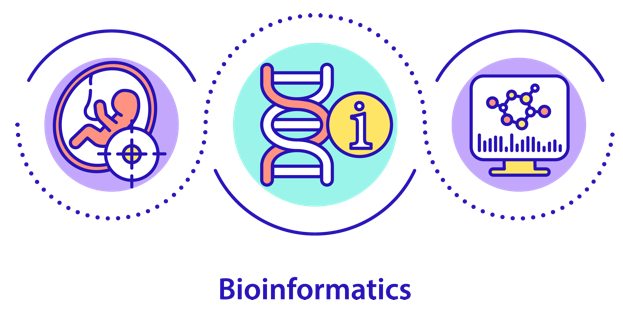Excitement About Bioinformatics Tutor
Excitement About Bioinformatics Tutor
Blog Article
Bioinformatics Tutor - An Overview
Table of ContentsBioinformatics Tutor Things To Know Before You BuyFascination About Bioinformatics TutorLittle Known Facts About Bioinformatics Tutor.The smart Trick of Bioinformatics Tutor That Nobody is DiscussingAll About Bioinformatics Tutor
Of the total amount individuals associated with the training, 80% were pupils from public higher education and learning organizations, while the remaining 20% originated from exclusive establishments. To qualify for a certification of involvement, students were required to participate in at the very least 90% of the total training hours. As an outcome of this requirement, an outstanding 95% of the individuals effectively obtained their certifications, having not just satisfied the minimum presence requirements however also completed all assigned activities throughout the training.
During the height of the COVID-19 pandemic, particularly in between June and August 2020, the project team was tasked with organizing specialized training in bioinformatics. This training was especially focused on pupils from the research team Core for Research study in Applied Computer at the Federal University of Pará (UFRA) The adaptation to remote discovering platforms because of the pandemic developed a chance to explore new training methodologies and electronic tools that boosted both reach and effectiveness.
To react to the expanding need in the computer and life scientific researches areas, an innovative course was presented in 2020 labelled Intro to Artificial intelligence. This training course was created to supply an accessible yet extensive summary of Artificial Intelligence techniques, particularly as used in bioinformatics. The program was accomplished over three months, from October to December 2020, and was delivered entirely online with the Google Meet platform. This digital layout enabled participation from students throughout Brazil, a lot of whom may not have had the opportunity to go to in-person sessions.
The Ultimate Guide To Bioinformatics Tutor
A noteworthy attribute of this program was its focus on hands-on discovering. Approximately 50% of the overall training hours were committed to useful activities where trainees constructed intelligent designs and applications in a range of scientific domain names, consisting of genes, molecular biology, and environmental information evaluation. Extensively made use of tools and structures such as Spyder, Google Colab, Jupyter Notebooks, and Orange were incorporated into the coursework. These systems made it possible for students to take part in real-time data control, version training, and formula experimentation.
The program brought in 80 individuals in overall. Sixty of them were connected with various college institutions in the state of Pará, while the staying twenty came from organizations found in five other Brazilian states. This wide geographical depiction highlighted the nationwide rate of interest in bioinformatics and the expanding need for specialized abilities in this location. By introducing Artificial Knowledge in a appropriate and useful context, the campaign offered to bridge the space in between theory and real-world application, offering pupils with a strong structure for future study or work in the area.
The training initiative created component of a wider scholastic outreach initiative called the Bioinformatics when traveling project. This task has, over the years, introduced lots of students to the world of bioinformatics and computational biology. The occasions held under this umbrella effort have taken location across numerous regions and years, as summarized in Table 1 (List of occasions, locations, years, and total varieties of pupils and teachers)
One of one of the most remarkable end results of the Bioinformatics when traveling campaign has actually been its contribution to the development of decentralized research teams. Several of these teams, at first united by their involvement in training events, have considering that gone on to generate independent scientific research in cooperation with local scholastic establishments. The training not only fostered scientific reasoning within the context of bioinformatics but also stimulated collaborative connections that extended past the training environment. These cooperations have brought about boosted local scientific performance and added meaningfully to the advancement of the more comprehensive bioinformatics community my sources in Brazil.
Bioinformatics Tutor Fundamentals Explained
The job itself was conceived and arranged by megabytes and RR, that managed the preparation and application of each step. Lectures were provided by a multidisciplinary team being composed of MB, FA, EF, KP, JS, DM, SN, LP, LG, A/C, rr, and ih. The exact same group, omitting IH and RR, likewise served as tutors for the functional training components. Funding for the project was offered through Read Full Article the give 88887.200562/ 2018-00 from CAPES. The writers expand their gratefulness to every person that contributed to the awareness of this project, whether directly or indirectly, because its inception.
The Federal University of Pará's Workplace of Research study (PROPESP/UFPA) also provided financial backing, particularly for the production of the last manuscript. The writers declare no economic or industrial problems of passion that can have affected the research. Furthermore, all interpretations and point of views shared in this article are only those of the authors and do not necessarily mirror those of their particular organizations, the author, editors, or reviewers associated with the publication procedure.

Not known Incorrect Statements About Bioinformatics Tutor
From an instructional point of view, the training technique used in the training was purposefully interactive. Classes were Full Report performed in a way that encouraged pupil involvement and conversation, going beyond rote memorization to check out how concepts are created, used in every day life, and tested in academic settings. The training philosophy concentrated on supporting both strong and having a hard time trainees, providing personalized assistance, and structure confidence with continual mentorship and patience.

Each team, consisting of roughly 36 participants, was sustained by three advisors-- the majority of whom were postdoctoral researchers with customized know-how. These coaches not only helped design the team projects yet also facilitated their implementation, guaranteeing that each research concern was both pertinent and properly challenging. The goal was to give a biologically practical context that participants might check out through flexible objectives and access to curated datasets.
For additional understandings into the technique and results of this project-based understanding approach, visitors are routed to S1 Text, which includes comprehensive descriptions of the pedagogical structure, assessment approaches, and project motifs utilized in the training sessions.
4 Easy Facts About Bioinformatics Tutor Described
Of the total participants involved in the training, 80% were trainees from public greater education organizations, while the staying 20% came from exclusive institutions. To certify for a certification of engagement, pupils were required to participate in at least 90% of the total training hours. Notably, beyond the trainees who enlisted in the training sessions, 7 seasoned teachers got involved in supplying the programs, while 3 committed study teachers worked with the total training procedure. About 50% of the total training hours were committed to practical tasks where pupils constructed intelligent designs and applications in a variety of scientific domains, including genetics, molecular biology, and environmental data analysis. The training not just cultivated clinical reasoning within the context of bioinformatics yet likewise sparked collective connections that extended beyond the training setting.
Report this page